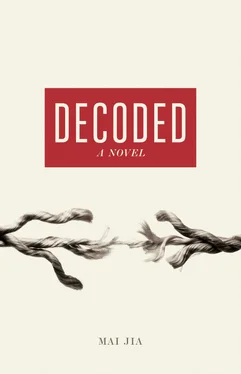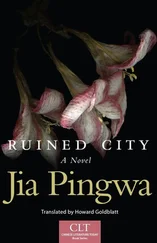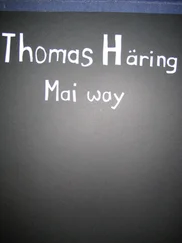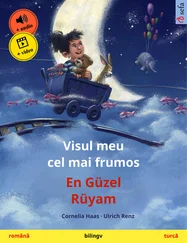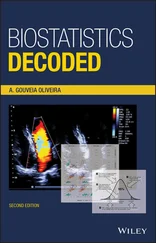Mai Jia - Decoded
Здесь есть возможность читать онлайн «Mai Jia - Decoded» весь текст электронной книги совершенно бесплатно (целиком полную версию без сокращений). В некоторых случаях можно слушать аудио, скачать через торрент в формате fb2 и присутствует краткое содержание. Год выпуска: 2014, Издательство: Allen Lane, Жанр: Современная проза, на английском языке. Описание произведения, (предисловие) а так же отзывы посетителей доступны на портале библиотеки ЛибКат.
- Название:Decoded
- Автор:
- Издательство:Allen Lane
- Жанр:
- Год:2014
- ISBN:нет данных
- Рейтинг книги:3 / 5. Голосов: 1
-
Избранное:Добавить в избранное
- Отзывы:
-
Ваша оценка:
- 60
- 1
- 2
- 3
- 4
- 5
Decoded: краткое содержание, описание и аннотация
Предлагаем к чтению аннотацию, описание, краткое содержание или предисловие (зависит от того, что написал сам автор книги «Decoded»). Если вы не нашли необходимую информацию о книге — напишите в комментариях, мы постараемся отыскать её.
Decoded — читать онлайн бесплатно полную книгу (весь текст) целиком
Ниже представлен текст книги, разбитый по страницам. Система сохранения места последней прочитанной страницы, позволяет с удобством читать онлайн бесплатно книгу «Decoded», без необходимости каждый раз заново искать на чём Вы остановились. Поставьте закладку, и сможете в любой момент перейти на страницу, на которой закончили чтение.
Интервал:
Закладка:
3. This child is very clever. These last few years, he has been my new-found-land. At every step, I have found myself amazed and impressed by his truly remarkable intelligence. Do not be misled by his somewhat misanthropic and cold personality; I believe that he is just as clever as his grandmother was, not to mention the fact that the two of them are as alike in appearance as two peas in a pod. She was exceptionally clever, extremely creative; an amazingly forceful personality. Archimedes said, ‘Give me a place to stand and I will move the earth.’ I believe that he is that kind of person. However, right now he needs you, because he isn’t quite twelve years old.
Believe what I tell you and take the child away from here. Bring him up in your home because he needs you, needs your love, and needs an education. Perhaps more than anything else, he needs you to give him a name. I beg you!
I beg you!
This is the first and last time I have ever begged anyone for anything.
The dying R. J.
Tongzhen, 8 June 1944
2
1944 was the worst year that the people of the provincial capital, C City — and N University at its heart — had ever experienced. First they suffered in the front line of battle; then they were ground under the heel of the Nanjing puppet government. This brought about an enormous change not only to the appearance of the city, but also to the hearts of its people. When Young Lillie received Mr Auslander’s letter, the worst of the fighting was already over, but the chaos unleashed by the bad faith of the temporary government had reached the point of no return. By this time Old Lillie had been dead for many years and Young Lillie’s position at N University had been adversely affected by the collapse in his father’s fortunes, not to mention the intransigent attitude of the puppet government. Nevertheless, the puppet government thought very highly of Young Lillie. First of all he was famous, which meant that he was useful to them in a way that an ordinary man wouldn’t have been; secondly the Rong family had suffered a great deal at the hands of the KMT government, so they were hoping that he would prove amenable. So when the puppet government was first established, they generously offered Young Lillie (at that time just acting vice-chancellor of the university) the job of chancellor, imagining that this would be all that it took to buy him. They were not expecting that he would tear up the brevet in front of everyone and proclaim in a stentorian voice: ‘We Rongs would rather die than betray our country!’
As you might imagine, Young Lillie’s answer was very popular, but it guaranteed that he was not going to find himself with an official position. He had already been thinking for some time of avoiding the repulsive overtures of the puppet government (and the associated ferocious infighting in the university) by going into hiding in Tongzhen, but Mr Auslander’s letter unquestionably speeded his departure. Still mulling over the letter, he stepped off the paddle-steamer. At a glance he picked out the steward of the Rong mansion from the crowd huddled together against the rain and wind. The steward asked him politely if he had had a good journey. Instead of responding, he asked abruptly, ‘How is Mr Auslander?’
‘Mr Auslander is dead,’ the steward said. ‘He passed away some weeks ago.’
Young Lillie felt his heart thump in his chest. Then he asked: ‘Where is the child?’
‘Who do you mean?’
‘Duckling.’
‘He is still at the Pear Garden.’
He was living in the Pear Garden, that was right enough, but no one seemed to know what he was doing in there, since he hardly ever came out and very few people bothered to go in. Everyone knew that he was living in the mansion, but he seemed to move from place to place like a lost soul, with hardly anyone even catching a glimpse of him. According to the steward, Duckling was the next best thing to a mute.
‘I don’t understand a thing that he says to me,’ the steward said. ‘He doesn’t often speak, and when he does, he might as well not bother, because no one can understand it.’
The steward also said that according to the servants in the main mansion, it was only because the old foreign gentleman got down on his hands and knees and kowtowed three times to the Third Master that he agreed to allow Duckling to carry on living at the Pear Garden after his death. Otherwise they would have thrown him out onto the street. He went on to say that Mr Auslander had left his savings of many decades to Duckling and that was what he was living on, since the Rong family couldn’t possibly afford to pay for his food.
It was lunchtime the next day when Young Lillie walked into the Pear Garden. The rain had stopped by then, but having fallen continuously for several days, it had washed the buildings clean while creating a thick squelchy layer of mud underfoot. His footsteps left deep prints in the mud and in some places it was deep enough to cover his galoshes. As far as Young Lillie could see, there were no other footprints to be seen — the spider’s webs in the trees were empty, the spiders having retreated under the eaves to get out of the rain. Some of them were now busily occupied spinning a new web in front of the door. If it were not for the smoke rising from the chimney and the sound of something being chopped on a block, he would have believed the place to be deserted.
Duckling was chopping up a sweet potato. There was boiling water in the pot on the stove, in which a few grains of rice were bobbing about. He did not seem alarmed at Young Lillie’s intrusion, nor was he angry. He just looked at him for a moment and then went back to his work, as if it was his grandfather who came in after a short absence — his grandfather or perhaps a dog? He was smaller than Young Lillie had been expecting, and his head was not as large as people said. His skull was dolichocephalic and oddly pointed on top; almost as if he were wearing a homburg hat — perhaps it was because of this that his head did not appear abnormally huge. Young Lillie did not find anything at all remarkable in his appearance; however, his cold, calm manner made a very deep impression; he was like a little old man. The only nice pieces of furniture in the room were the medicine chest (left over from the original use of the building), a table and a director’s chair. There was a large volume lying open on the table, a musty smell emanating from its leaves. Young Lillie closed the book so that he could read the title on the spine: it was an English book — one volume of the Encyclopedia Britannica . Young Lillie put the book down and looked questioningly at the child. Then he asked, ‘Are you reading this?’
Duckling nodded.
‘Can you understand it?’
Duckling nodded again.
‘Did Mr Auslander teach you?’
He nodded again.
‘You don’t say anything: is this because you are mute?’ As Young Lillie spoke, he realized that his tone of voice was more aggressive than he had intended, as if he were blaming the child. ‘If you are then nod your head twice. If you are not, then say so.’ Because he was afraid that the child might not understand Chinese, Young Lillie repeated what he had said in English.
Duckling walked over to the stove, put the sweet potato that he had just finished chopping into the water and replied in English that he was not a mute.
Young Lillie asked him again if he could speak Chinese and Duckling replied — in Chinese — that he could.
Young Lillie laughed and said, ‘Your Chinese is as bad as my English. Did you learn it from Mr Auslander?’
Duckling nodded again.
Young Lillie said, ‘Don’t nod.’
Duckling said, ‘Fine.’
Читать дальшеИнтервал:
Закладка:
Похожие книги на «Decoded»
Представляем Вашему вниманию похожие книги на «Decoded» списком для выбора. Мы отобрали схожую по названию и смыслу литературу в надежде предоставить читателям больше вариантов отыскать новые, интересные, ещё непрочитанные произведения.
Обсуждение, отзывы о книге «Decoded» и просто собственные мнения читателей. Оставьте ваши комментарии, напишите, что Вы думаете о произведении, его смысле или главных героях. Укажите что конкретно понравилось, а что нет, и почему Вы так считаете.
